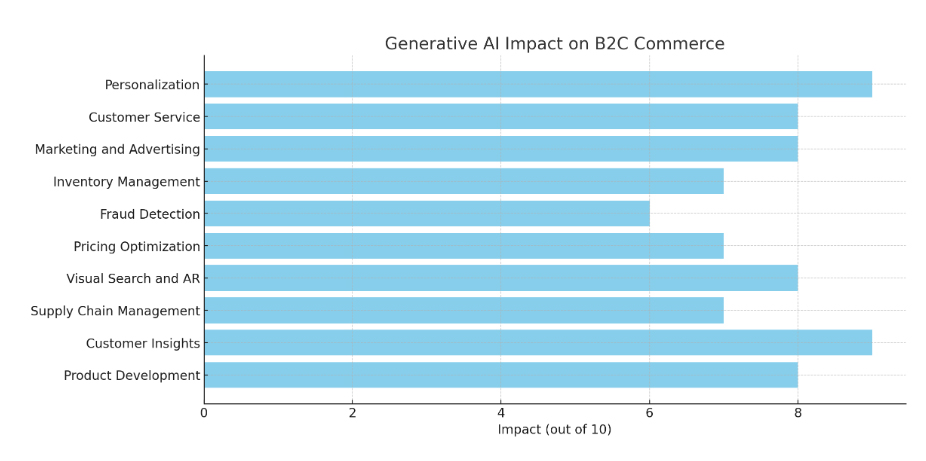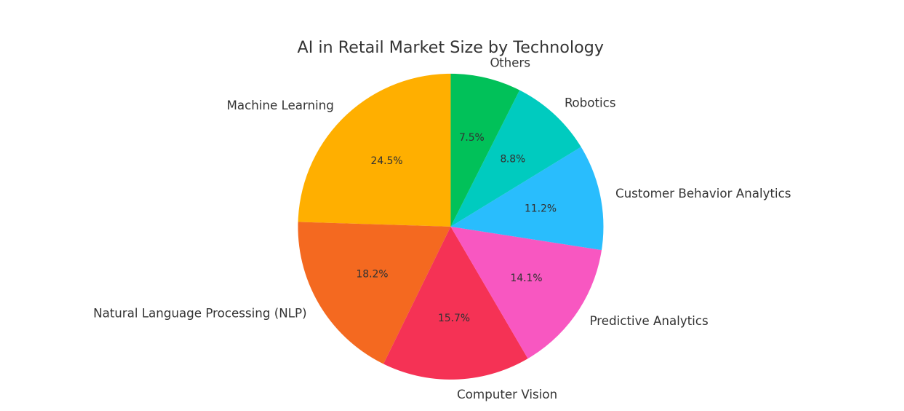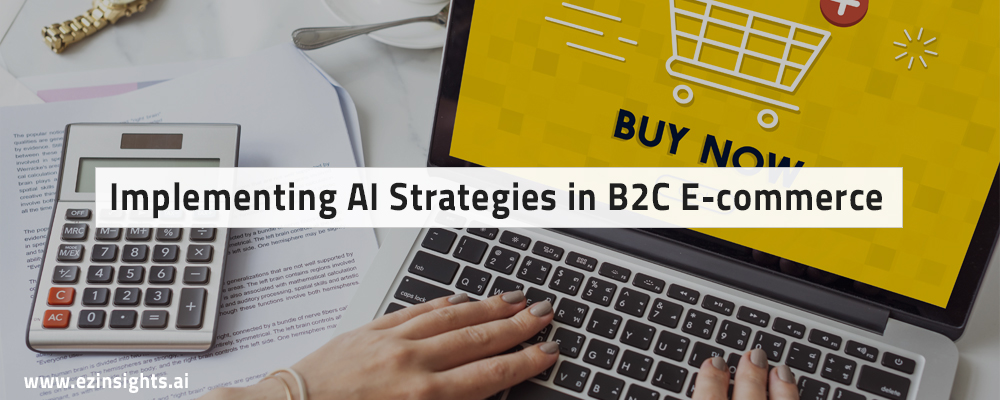In the ever-changing market of B2C e-commerce, companies are constantly looking for methods to remain ahead of the competition and improve client experiences. Artificial intelligence is one of the most transformational forces in this sector. AI tactics are changing the way merchants connect with their customers, from better customer service to more personalized purchasing experiences. This comprehensive book investigates the impact of gen AI on B2C commerce, presents instances of AI in e-commerce, and digs into AI and generative AI in retail.
Jump to:
The Rise of AI in B2C E-commerce
The Gen AI Impact on B2C Commerce
AI in E-Commerce: Real-World Examples
AI in Retail: Transforming the Shopping Experience
Generative AI in Retail: Pioneering New Frontiers
AI in Shopping Malls: Enhancing the Physical Retail Experience
The Rise of AI in B2C E-commerce
The integration of AI in B2C e-commerce has transformed the sector by providing novel solutions to typical retail difficulties. Businesses may now provide tailored shopping experiences, streamline processes, and make data-driven choices thanks to the advancements in generative AI and algorithms. Understanding the different applications and benefits of AI in retail is critical to maximizing its potential.
The Gen AI Impact on B2C Commerce

Generative AI, a subset of AI technology, has a significant impact on B2C transactions. This approach entails training models on enormous datasets to produce fresh, synthetic data that closely matches real-world data. Generative AI has various applications in e-commerce, including:
Personalized Product Recommendations
By monitoring user behavior and preferences, generative AI may generate very accurate product suggestions. This improves the shopping experience while also increasing conversion rates and consumer happiness.
Dynamic Pricing Strategies
Generative AI models may assess market trends, competitive price, and customer demand to provide the best pricing strategies. This allows retailers to alter prices in real time to optimize revenues while remaining competitive.
Enhanced Customer Support
Chatbots and virtual assistants powered by generative AI can respond to customer requests in real time and with high accuracy. This reduces the requirement for human interaction while improving reaction times.
Content Generation
Generative AI can produce engaging product descriptions, marketing copy, and other material. This assures uniformity and relevancy across several touchpoints while saving time and effort on content generation.
AI in E-Commerce: Real-World Examples
To demonstrate the impact of AI in e-commerce, consider some practical examples:
Amazon’s AI-Powered Recommendations
Amazon’s advanced AI algorithms evaluate user data and recommend products based on individual tastes. This personalization is powered by AI models that learn from user behavior, resulting in improved engagement and revenue.
Chatbots by Sephora
Sephora, a global cosmetic retailer, uses AI-powered chatbots to help customers identify goods, provide beauty suggestions, and schedule appointments. These chatbots use natural language processing (NLP) to successfully interpret and reply to client requests.
Walmart’s AI-Enhanced Inventory Management
Walmart uses AI to optimize its inventory management procedures. By evaluating sales data, market trends, and customer preferences, AI systems assist Walmart in forecasting demand, managing stock levels, and reducing waste.
H&M’s Virtual Fitting Rooms
H&M has incorporated AI-powered virtual fitting rooms, allowing shoppers to see how garments would appear on them before physically trying them on. This improves the online purchasing experience, and lowers return rates.
AI in Retail: Transforming the Shopping Experience

AI isn’t just for online retail; it’s also making considerable progress in physical locations. The incorporation of AI in retail environments can improve the shopping experience in a variety of the following ways:
Smart Shelves
AI-powered smart shelves utilize sensors and cameras to monitor inventory levels and consumer interactions. This technology assists shops in ensuring that popular items are always in stock and provides information into purchase habits.
Personalized In-Store Recommendations
AI may evaluate customer data to make personalized recommendations and promotions depending on their in-store activity. For example, if a consumer routinely purchases exercise products, they may receive personalized offers for similar items.
Automated Checkout Systems
AI-powered automated checkout systems, such as Amazon Go, enable users to shop without the need for traditional checkout procedures. These systems utilize computer vision and artificial intelligence to track things and automatically charge clients.
Enhanced Customer Insights
AI systems may evaluate in-store data like foot traffic and dwell periods to help companies understand customer behaviour. This information can be utilized to optimize store layouts and enhance the overall shopping experience.
Generative AI in Retail: Pioneering New Frontiers
Generative AI is especially intriguing for the retail industry since it opens new avenues for innovation:
Virtual Storefronts
Generative AI can develop virtual stores and immersive shopping experiences. Retailers can create virtual stores that resemble real-world shopping settings, allowing customers to browse and buy things in a virtual setting.
AI-Generated Fashion Designs
Fashion stores can employ generative AI to produce distinctive clothing designs and patterns. AI algorithms can evaluate trends and create new patterns that reflect current fashion tastes.
Customized Marketing Campaigns
Generative AI can create highly focused marketing campaigns by producing individualized content and offers. This guarantees that marketing communications connect with clients and increase engagement.
Product Development and Innovation
Retailers can use generative AI to design new products based on market trends and customer input. This helps to create products that fit changing consumer wants and tastes.
AI in Shopping Malls: Enhancing the Physical Retail Experience
Shopping centres are also using AI to improve the in-person shopping experience:
Intelligent Mall Directories
AI-powered digital directories can offer real-time updates on retail locations, sales, and events. These directories can also make personalized recommendations based on consumer preferences and browsing behaviour.
Smart Parking Solutions
AI-powered smart parking systems can direct customers to available parking spaces, decreasing aggravation and improving the whole mall experience. These devices monitor the availability of parking spaces using sensors and AI algorithms.
Interactive Kiosks
AI-enabled interactive kiosks can provide information, help with navigation, and provide personalized suggestions based on consumer preferences. These kiosks improve the shopping experience and offer important assistance.
Predictive Analytics for Foot Traffic
AI can study foot traffic patterns and predict peak shopping hours. This data enables mall operators to improve workforce numbers and properly manage resources.
Challenges of Generative AI in B2C E-commerce
Generative AI in B2C e-commerce has considerable benefits, but it also faces challenges such as balancing privacy and personalization, assuring content quality, managing customer expectations, and addressing ethical, technological, and legal issues. Navigating these complications is critical to successful adoption.
Further elaborating on these challenges –
Personalization vs. Privacy: Personalizing experiences while protecting consumer data privacy and ensuring regulatory compliance.
Content Quality and Consistency: Ensure that AI-generated content satisfies quality requirements and maintains brand consistency.
Accuracy of Product Recommendations: Preventing errors and irrelevant AI-generated recommendations.
Managing Customer Expectations: Integrating AI successfully to fulfil high customer expectations and develop consistently.
Ethical and Bias Concerns: Preventing unfair practices by mitigating biases in AI systems.
Integration with Existing Systems: Managing the technical and financial obstacles of integrating AI into existing e-commerce platforms.
Customer Trust and Transparency: Building trust by communicating clearly about AI use and assuring authenticity.
Scalability and Resource Management: Scalability of AI applications is ensured by managing their resource-intensive nature.
Legal and Compliance Issues: Addressing legal issues, such as intellectual property and responsibility for AI-generated material.
Consumer Education and Adoption: To increase consumer adoption, educate them on the benefits and functionalities of AI.
Conclusion
Implementing AI methods in B2C e-commerce is no longer a luxury, but rather a requirement for remaining competitive in the modern retail scene. Gen AI has a significant impact on B2C commerce, providing several benefits such as tailored suggestions, dynamic pricing, and improved customer service. Businesses can learn about real uses and successful implementations of AI in e-commerce.
The use of AI in retail, particularly generative AI, is rapidly expanding, paving the door for new solutions and better customer experiences. From virtual fitting rooms to automated checkout systems, artificial intelligence is revolutionizing both online and offline retail environments.
As technology advances, adopting AI methods will be critical for retailers looking to improve operations, engage customers, and drive growth. The future of retail is inextricably linked to AI, and those who harness its power successfully will pave the road for the next phase of B2C e-commerce.
Businesses that use AI technology may not only keep up with changing customer expectations, but also establish new benchmarks for innovation and quality in the retail industry. The journey to AI-driven retail excellence is only beginning, and the prospects for development and transformation are limitless.
FAQs
What are the key benefits of implementing AI strategies in B2C e-commerce?
Implementing AI can improve customization, customer service through chatbots, product recommendations, inventory management, and data analytics, resulting in enhanced customer happiness and operational efficiency.
How can businesses ensure the ethical use of AI in e-commerce?
Businesses may assure ethical AI use by integrating openness in AI processes, eliminating bias in algorithms, following data privacy legislation, and assessing AI systems on a regular basis for fairness and accuracy to preserve customer trust and adhere to ethical norms.
What are the main challenges businesses face when integrating AI into their e-commerce platforms?
Balancing personalization and privacy, ensuring content quality and consistency, managing consumer expectations, integrating AI with existing systems, resolving ethical and prejudice concerns, and managing AI technology resource demands are all significant challenges.
How can businesses measure the success of their AI strategies in e-commerce?
Success can be quantified using a variety of indicators, including conversion rate increases, customer engagement levels, revenue growth, operational cost reductions, customer happiness scores, and the effectiveness of AI-driven recommendations and personalization.

Anupama Desai
President & CEO
Anupama has more than 23 years of experience as business leader and as an advocate for improving the life of the business users. Anupama has been very active in bringing business perspective in the technology enabled world. Her passion is to leverage information and data insights for better business performance by empowering people within the organization. Currently, Anupama leads Winnovation to build world class Business Intelligence application platform and her aim is to provide data insights to each and every person within an organization at lowest possible cost.

